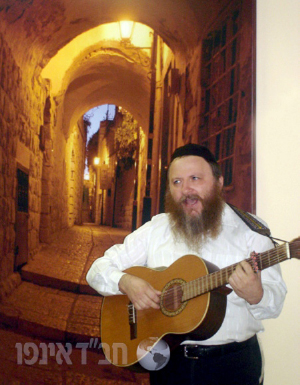When I told R’ Michoel Nudelman that I’m calling from Beis Moshiach about the outreach activities that he does, he asked me, what activity? I thought he was being modest but he really wanted to know which of his activities I wanted to write about. That’s the way it is when you do mivtzaim at work, write and compose music and perform for Russian immigrants, run a shul, and go on mivtzaim to kibbutzim!

Name: Michoel Nudelman
Age: 47
Children: 7
Location: Tzfas
Occupation: Computer Programmer and Database Developer
Michoel was born in the former Soviet Union and took his first steps in Judaism while still under communist rule. After perestroika and the fall of the Iron Curtain, shluchim arrived in Charson and he began to openly learn about Judaism.
In 5751, Michoel emigrated with the huge wave of aliya from the Soviet Union and settled in Kibbutz Kfar Szold. Then he moved to Karmiel where he met R’ Rivkin with whom he continued to make progress in Torah study and mitzva observance.
Now, Michoel lives in Tzfas. Every morning, he goes to the Delta Galil Textile factory where he works as a director of computer programming and database development.
“At work, I do all the standard things.” When he says “standard things,” he doesn’t mean managing employees or business meetings, but an array of outreach activities and mivtzaim.
“Typical activities include making the rounds with t’fillin once a week. I always have a pair of t’fillin with me and everyone knows that whoever wants to put on t’fillin can come over to me. But once a week, I make the rounds throughout the entire factory and put t’fillin on with employees.”
When I asked how people react, he said, “Boruch Hashem, I get excellent feedback. They don’t all put on t’fillin but they all regard it with respect. There are ‘regular customers’ and ‘occasional customers’ who put t’fillin on sometimes. And there are ‘new customers’ who are guests or employees who gradually join those who put on t’fillin.
“Aside from that, now and then we have shiurim for employees of the company. I invite a lecturer or I give the talk myself. Boruch Hashem, there is interest in this too.
“And then there are seasonal activities like lighting the menorah on Chanuka, blowing the shofar in Elul, and before Pesach I try to distribute shmura matza to the employees. In general, people come to consult with me and to ask questions about Judaism.”
MUSICAL SHLICHUS
According to Michoel, the mivtzaim he does at work he does because that is his obligation as a Chassid, but he sees his life’s shlichus as his impact on Russian immigrants through his music.
“Music was always my hobby,” he says. “But in recent years, I decided that if G-d gave me this talent, I need to use it to spread Judaism.”
Michoel writes, composes, and sings songs on Jewish topics such as Moshiach and Geula, all in Russian.
“I perform before various audiences, usually for immigrants from the CIS. I sing and I speak. My songs have messages of faith, of Judaism. These are songs that are encouraging and fortifying. There are songs with simple messages and songs with deeper messages.”
He recently produced his first CD of songs. Some of them have become hits in the Russian sector in Eretz Yisroel and in the CIS.
CLOSURE
Michoel does a lot of volunteer performing for U’faratzta – Chabad on the kibbutzim.
“Whenever they ask me, I go. I have performed at dozens of kibbutzim. I sing for them in Hebrew and sometimes in Russian and they react with smiles and simcha.”
He recently committed to regularly arranging the activities at Kibbutz Kfar Szold, the kibbutz he lived in when he first made aliya.
“I know some of the people from back then and when I go there, I’m moved. I feel like I’m closing a circle.”
Some time ago, Michoel lost his good friend who died in his prime. He felt that something had to be done l’ilui nishmaso so he decided to open a shul.
“In Tzfas there are many Russian immigrants and we decided to open a Chabad shul with the atmosphere they are familiar with, where they can feel comfortable and come close to Judaism.” The shul of Nudelman and his compatriots is referred to in Tzfas as the Russian shul, but he says the shul is open to all.